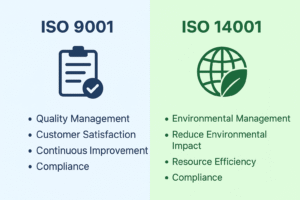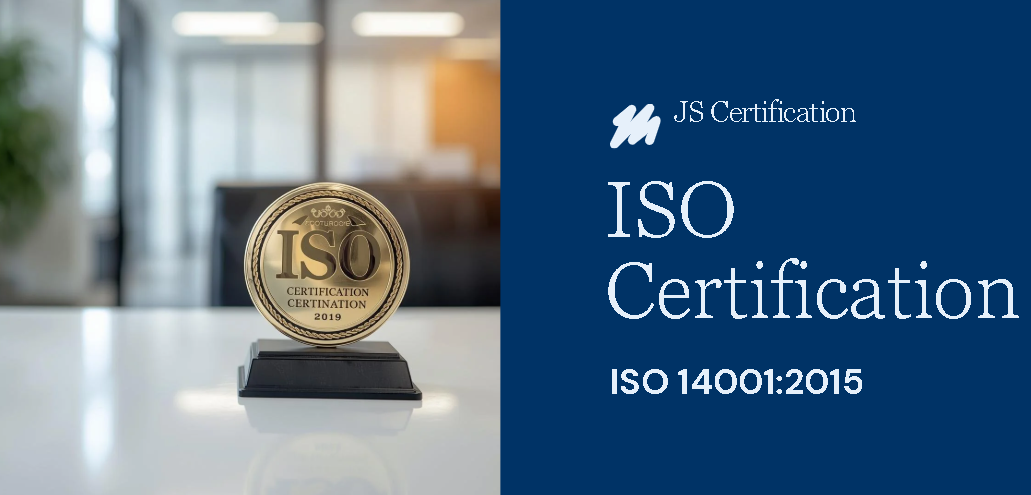Environmental sustainability is now a core expectation for businesses across all sectors. Whether you operate a manufacturing unit, an IT company, a construction project, or a service-based organisation, reducing environmental impact has become essential for compliance, reputation, and long-term growth.
ISO 14001 Certification provides a structured, internationally recognized framework to help businesses manage environmental responsibilities efficiently and systematically.
What Is ISO 14001 Certification?
ISO 14001 is the global standard for Environmental Management Systems (EMS). It guides organizations in identifying environmental aspects, controlling negative impacts, reducing resource wastage, and complying with regulatory requirements.
The standard focuses on continuous improvement in areas such as
- Energy and resource efficiency
- Waste reduction
- Pollution control
- Legal compliance
- Emergency preparedness
ISO 14001 applies to organizations of all sizes and industries—any business that interacts with the environment directly or indirectly.
Key Benefits of ISO 14001 Certification
✔ Improved Environmental Performance
Implementation of ISO 14001 helps businesses evaluate their activities, reduce harmful environmental impacts, and follow structured controls for better efficiency.
✔ Legal & Regulatory Compliance
The certification ensures that your company follows applicable environmental laws, reducing the risk of penalties, shutdowns, or compliance gaps.
✔ Cost Savings Through Resource Optimisation
Efficient use of energy and raw materials, and waste reduction lowers operational expenses over time.
✔ Enhanced Corporate Image
Clients, government authorities, and partners view ISO-certified businesses as more credible, responsible, and trustworthy.
✔ Better Risk Management
Environmental risks such as spills, emissions, or improper waste disposal are managed through preventive measures.
✔ Employee Awareness & Participation
ISO 14001 encourages environmental awareness among employees, leading to responsible behavior and improved internal processes.
✔ Competitive Market Advantage
Many industries prefer or mandate ISO 14001 for vendor selection, giving certified companies a stronger position in tenders and global supply chains.
Who Should Implement ISO 14001?
- Manufacturers & industrial plants
- Construction companies
- Hospitals & healthcare institutions
- Educational institutions
- Hotels, restaurants & service industries
- Logistics & transportation companies
- IT & corporate offices
- Government bodies and NGOs
Any organization aiming to control environmental risks and improve sustainability can benefit from this standard.
ISO 14001 Certification Process
1. Gap Analysis
Assessment of your existing environmental processes compared to ISO 14001 requirements.
2. Documentation Development
Preparation of essential EMS documents.
3. Implementation
Execution of the EMS framework across departments—ensuring proper controls, roles, and responsibilities are defined.
4. Internal Audit
A thorough internal evaluation to identify nonconformities and areas for improvement.
5. Certification Audit
An external auditor reviews the system. Upon successful evaluation, ISO 14001 certification is issued.
6. Surveillance Audits
Periodic audits ensure that the EMS remains effective and updated.
ISO 14001 Certification Cost
The cost of ISO 14001 certification varies depending on the size, structure, and operational activities of your organisation. Key factors that influence pricing include
1. Number of Employees
Larger teams require more documentation, audit time, and compliance checks.
2. Nature of Business Activities
Industries with higher environmental impact (manufacturing, chemical, construction) may require deeper audits compared to low-impact sectors.
3. Number of Locations
If your organisation operates across multiple sites, each location must be covered under the Environmental Management System (EMS).
4. Documentation & Implementation Requirements
Companies with limited existing documentation may need additional support. Costs may vary for larger enterprises or specialised industries, depending on audit duration and compliance needs.
JS Certification ensures transparent and industry-appropriate pricing for organisations at different operational levels.
Documents Required for ISO 14001 Certification
Typical documents include:
- Company registration
- GST details
- Scope of work
- Environmental aspect–impact analysis
- Compliance records for environmental laws
- Waste handling procedures
- Employee and department information
- Monitoring and measurement logs

Difference between ISO 9001 and 14001
Why Choose JS Certification?
- ✔ Fast certification process
- ✔ Highly experienced ISO consultants
- ✔ Transparent pricing—no hidden charges
- ✔ Full support for documentation & implementation
- ✔ 24/7 customer assistance
- ✔ Recognised and trusted certification body
Final Note
With years of experience in environmental audits and compliance, JS Certification is the preferred choice for thousands of businesses across India.
FAQ
1. What is ISO 14001 Certification?
ISO 14001 is an international standard that guides organisations in developing an effective Environmental Management System to reduce environmental impact and maintain regulatory compliance.
2. Who needs ISO 14001 Certification?
Any organisation that interacts with the environment—industries, service providers, manufacturers, construction, healthcare, education, and commercial sectors—can benefit from ISO 14001.
3. How long does it take to get ISO 14001 Certification?
The process usually takes 5 to 30 days, depending on preparedness, documentation, and audit requirements.
4. What documents are required for certification?
- Company registration details
- GST certificate
- Environmental policy
- Aspect–impact analysis
- Legal compliance records
- Waste management procedures
- Monitoring and measurement logs
5. Is ISO 14001 mandatory in India?
ISO 14001 is not legally mandatory, but many industries, tenders, and clients prefer or require certified companies for environmental compliance and credibility.
6. What is the validity of the certificate?
ISO 14001 certification is valid for three years, with annual surveillance audits to maintain compliance.
7. Does ISO 14001 help reduce costs?
Yes. By improving resource efficiency, reducing waste, and preventing environmental risks, organisations often achieve significant cost savings over time.
8. Can service-based companies also get ISO 14001?
Absolutely. ISO 14001 applies to both product-based and service-oriented organisations—including IT companies, logistics, consultancies, and educational institutions.
9. Does JS Certification provide implementation support?
Yes. JS Certification assists with gap analysis, documentation, EMS implementation, training, internal audits, and preparation for the final certification audit.
10. Do we need to renew the certificate?
After three years, organisations must undergo a recertification audit to renew their ISO 14001 certificate.

